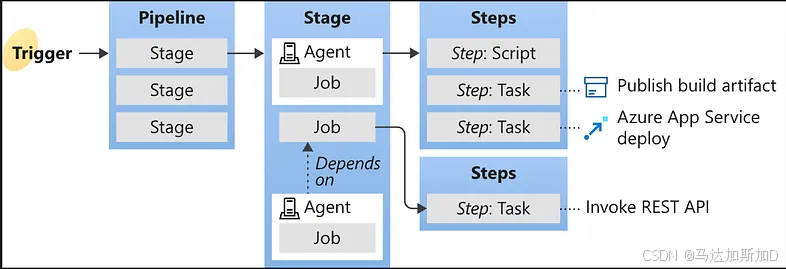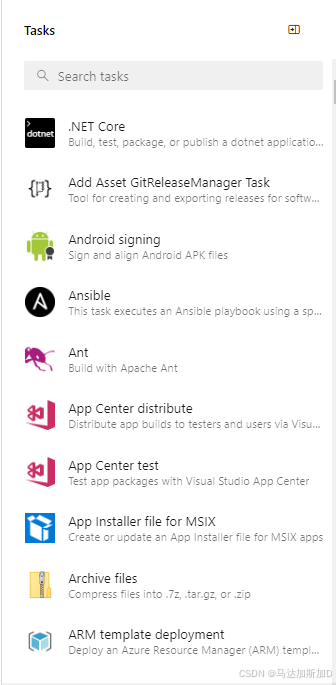DevOps --- Pipeline和Yaml文件
什么是Pipleine
- 在DevOps中pipeline可以按顺序在一台虚拟机上实现一组特定的操作,包括但不限于
- 执行git命令,如拉取代码,push代码等
- 执行任意程序
- 执行python或bash脚本
- …
- 基于以上操作,pipeline通常可以完成以下场景
- 持续集成:拉取代码,运行代码质量检查工具,运行集成测试,部署代码等
- 使用第三方控件对代码进行安全扫描(DAST, Image,SAST等)
- 定时运行E2E测试
- …
什么是Yaml文件
- 和Json,XML类似,YAML(YAML Ain’t Markup Language)是一种数据序列化格式。经常被用于配置文件和数据交换格式,特别适用于各种编程语言之间的数据传递.
- 在微软的DevOps中,yaml通常用来定义一个pipeline
Yaml文件的构成
- 一个pipeline 由多个stages组成
- 一个stage由多个jobs组成
- 每个Job可以在一个agent上执行(一个Job也可以没有agent)
- an agent could be an VM or sometimes an VM can have multiple agents
- 一个job由多个steps组成
- steps可以是task或script,是pipeline的最小构建单元
- task是一些Azure DevOps预先设定好的功能,可以直接使用. 常用的task包括,
- PythonScript@0
- PowerShell@2
- Docker@1
- CopyFiles@2
- PublishTestResults@2
- …
- 可以在ADO中搜索
- Trigger
- This states what changes trigger the pipeline. For the example in the below code, changes in the main branch alone trigger the pipeline run and not from the feature branches.
- Pool
- When your build or deployment runs, the system begins one or more jobs. An agent is a computing infrastructure with installed agent software that runs one job at a time. For example, your job could run on a Microsoft-hosted Ubuntu agent. The below pipeline yaml uses “ubuntu-latest”
- Variables
- Variables are a way to get key bits of data into various parts of the pipeline.
- The most common use of variables is to define a value that you can then use in your pipeline.
- All variables are strings and are mutable. The value of a variable can change from run to run or job to job of your pipeline.
Example
trigger:
branches:
include:
- main
exclude:
- feature_branches
pool:
vmImage: 'ubuntu-latest'
variables:
- name: tag
value: '$(Build.BuildNumber)'
- name: ImageName
value: "demo Image"
- name: python.version
value: '3.8'
schedules:
- cron: "0 18 1 * *"
always: true
displayName: Monthly, 2nd, 2:00 am (utc+8)
branches:
include:
- master
stages:
- stage: Lint
displayName: Format and lint code
jobs:
- job: Linting
steps:
- script: |
python3 -m pip install black
python3 -m pip install pylint
displayName: "Install dependencies"
- script: |
#app is the folder in which the application code resides
python3 -m black ./app
displayName: "Apply black code formatting"
- script: |
python3 -m pylint ./app --recursive=true --exit-zero
displayName: "Static code analysis with pylint"
- stage: Test
displayName: Unit test
jobs:
- job: Test
steps:
- script: |
python3 -m pip install -r requirements.txt
python3 -m pip install pytest-azurepipelines
displayName: "Install dependencies"
- script: |
python3 -m pytest -v -s --junitxml=unittest/junit.xml --cov=. --cov-report=term-missing --cov-report=xml
- stage: Build
displayName: 'Build and Push Docker Image'
jobs:
- job: BuildAndPush
displayName: 'Build and Push Docker Image'
steps:
- task: Docker@1
displayName: 'Build an image'
inputs:
containerregistrytype: 'Azure Container Registry'
azureSubscriptionEndpoint: 'Service connection name'
azureContainerRegistry: '<<democontainer-DEV.azurecr.io>>'
command: 'Build an Image'
dockerFile: '$(System.DefaultWorkingDirectory)/Dockerfile'
tags: |
latest
$(Build.BuildId)
imageName: '$(ImageName):$(tag)'
- task: Docker@1
displayName: 'Push image to ACR to TEST'
inputs:
containerregistrytype: 'Azure Container Registry'
azureSubscriptionEndpoint: '<<demoserviceconenction>>'
azureContainerRegistry: 'container registary name-DEV.azurecr.io'
command: 'Push an image'
imageName: '$(ImageName):$(tag)'
- task: Docker@1
displayName: 'Build an image'
inputs:
containerregistrytype: 'Azure Container Registry'
azureSubscriptionEndpoint: 'Service connection name'
azureContainerRegistry: 'container registary name-PROD.azurecr.io'
command: 'Build an Image'
dockerFile: '$(System.DefaultWorkingDirectory)/Dockerfile'
tags: |
latest
$(Build.BuildId)
imageName: '$(ImageName):$(tag)'
- task: Docker@1
displayName: 'Push image to ACR to PROD'
inputs:
containerregistrytype: 'Azure Container Registry'
azureSubscriptionEndpoint: 'Service connection name'
azureContainerRegistry: 'container registary name-PROD.azurecr.io'
command: 'Push an image'
imageName: '$(ImageName):$(tag)'
- task: CopyFiles@2
inputs:
SourceFolder: 'kubernetes'
Contents: '*.yaml'
TargetFolder: '$(Build.ArtifactStagingDirectory)'
- task: PublishBuildArtifacts@1
inputs:
PathtoPublish: '$(Build.ArtifactStagingDirectory)'
ArtifactName: 'manifest'
publishLocation: 'Container'

